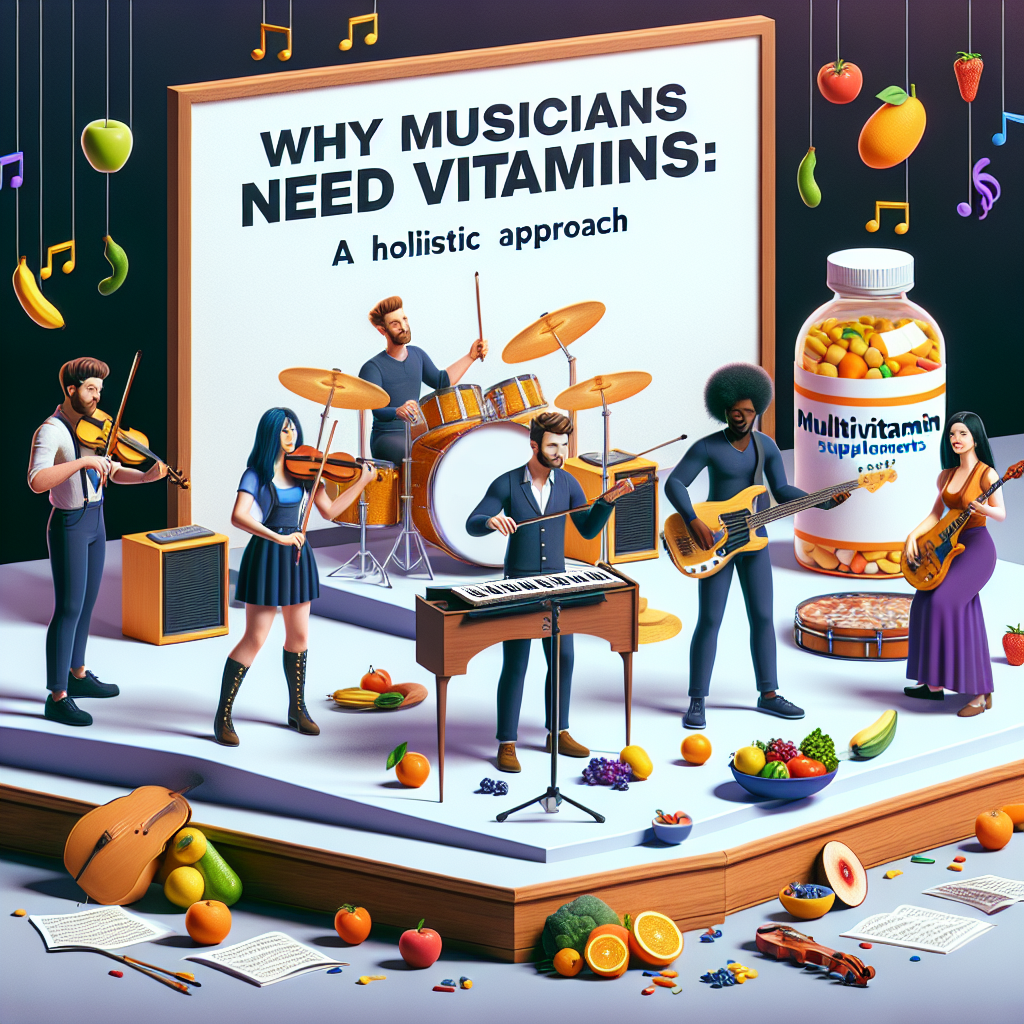Why Musicians Need Vitamins: A Holistic Approach

Discover why vitamins are essential for musicians and how a holistic approach can enhance your performance. Learn more about the importance of nutrition in music and start your journey towards a healthier lifestyle. Click here to explore more.
The Essential Role of Vitamins in Enhancing Musicians’ Performance
Musicians, like athletes, require a certain level of physical and mental stamina to perform at their best. The demands of long rehearsals, late-night performances, and the stress of creativity can take a toll on their health. This is where a holistic approach to health, particularly the intake of essential vitamins, comes into play.
Vitamins are organic compounds that our bodies need in small quantities for normal growth and metabolism. They play a crucial role in maintaining our overall health and wellbeing. For musicians, these nutrients can significantly enhance their performance by boosting their energy levels, improving their concentration, and promoting their emotional wellbeing.
One of the key vitamins that musicians should consider is Vitamin B complex. This group of vitamins, which includes B1 (thiamine), B2 (riboflavin), B3 (niacin), B5 (pantothenic acid), B6 (pyridoxine), B7 (biotin), B9 (folate), and B12 (cobalamin), plays a vital role in maintaining good health and wellbeing. They help the body convert food into fuel, which is then used to produce energy. This is particularly beneficial for musicians who often have to endure long hours of physical activity. Moreover, B vitamins are also known to improve brain function and reduce stress and fatigue, which can significantly enhance a musician’s performance.
Vitamin C is another essential nutrient that musicians should incorporate into their diet. This vitamin is a powerful antioxidant that helps protect the body against free radicals, which are harmful molecules that can damage cells and contribute to aging and diseases. Vitamin C also plays a crucial role in maintaining a healthy immune system, which is particularly important for musicians who often have to travel and are exposed to different environments and climates.
In addition to Vitamin B complex and Vitamin C, musicians should also consider incorporating Vitamin D into their diet. This vitamin is known to promote bone health, which is particularly important for musicians who play instruments that require physical exertion, such as the drums or the guitar. Moreover, Vitamin D is also known to promote mental health by helping to regulate mood and ward off depression, which can be particularly beneficial for musicians who often have to deal with the pressures and stresses of their profession.
Lastly, musicians should also consider incorporating Omega-3 fatty acids into their diet. While not a vitamin, this nutrient plays a crucial role in maintaining brain health and function. It is known to improve cognitive function and promote emotional wellbeing, which can significantly enhance a musician’s performance.
In conclusion, vitamins play an essential role in enhancing musicians’ performance. They not only help boost energy levels and improve concentration but also promote emotional wellbeing. By incorporating these nutrients into their diet, musicians can ensure that they are at their best, both physically and mentally, and are able to deliver outstanding performances. Therefore, a holistic approach to health, which includes the intake of essential vitamins, should be an integral part of every musician’s lifestyle.
Understanding the Holistic Connection: Musicians, Vitamins, and Optimal Health

Musicians, like any other professionals, require a balanced diet to maintain their overall health and well-being. However, the unique demands of their profession necessitate a more focused approach to nutrition, particularly in terms of vitamin intake. This is where a holistic approach comes into play, emphasizing the interconnectedness of musicians’ physical health, mental well-being, and artistic output.
The life of a musician is often characterized by irregular schedules, frequent travel, and high-stress performances. These factors can take a toll on their health, leading to fatigue, weakened immunity, and even impaired cognitive function. Vitamins, as part of a balanced diet, can help counter these effects. For instance, B vitamins are known to boost energy levels and improve brain function, while vitamin C is essential for a strong immune system.
Moreover, the physical exertion involved in playing an instrument or singing can be likened to that of an athlete. Musicians often experience muscle strain, joint pain, and other physical discomforts. Vitamins D and E, along with calcium, can help strengthen bones and muscles, reducing the risk of injury.
However, the benefits of vitamins for musicians extend beyond physical health. There is a growing body of research suggesting a link between nutrition and mental health. For instance, deficiencies in certain vitamins, such as B12 and D, have been associated with mood disorders like depression and anxiety. Given the high-stress nature of their profession, musicians are particularly susceptible to these conditions. By ensuring adequate vitamin intake, musicians can potentially mitigate these risks and maintain their mental well-being.
Furthermore, vitamins can also play a role in enhancing a musician’s creative output. The brain, like any other organ, requires certain nutrients to function optimally. B vitamins, for instance, are known to support brain health and cognitive function. This includes memory, focus, and even creativity – all of which are crucial for a musician’s performance and creative process.
However, it’s important to note that vitamins alone cannot guarantee optimal health and performance. They should be part of a holistic approach to health that includes a balanced diet, regular exercise, adequate sleep, and stress management. Musicians, like everyone else, should consult with a healthcare professional before starting any new supplement regimen.
In conclusion, vitamins play a crucial role in supporting the physical health, mental well-being, and creative output of musicians. They help counter the unique challenges posed by the profession, from physical exertion and irregular schedules to high-stress performances. However, they should be part of a holistic approach to health that considers the interconnectedness of these aspects. By taking care of their health in this holistic manner, musicians can not only enhance their performance but also their overall quality of life.
The holistic connection between musicians, vitamins, and optimal health is a testament to the power of nutrition. It underscores the importance of a balanced diet for everyone, regardless of their profession. For musicians, however, it’s not just about maintaining health – it’s about enabling their art.
Why Musicians Should Prioritize Vitamin Intake: A Comprehensive Guide
Musicians, like athletes, require a unique set of physical and mental attributes to perform at their best. They need to have excellent hand-eye coordination, a keen sense of timing, and the ability to concentrate for extended periods. However, the demands of a musician’s lifestyle can often lead to neglecting their health, particularly their nutritional needs. This is where vitamins come into play. A holistic approach to health and wellness, which includes a balanced diet rich in essential vitamins, can significantly enhance a musician’s performance and overall well-being.
Vitamins are organic compounds that our bodies need in small amounts to function correctly. They play a crucial role in various bodily functions, including energy production, immune function, and maintaining the health of our skin, eyes, and brain. For musicians, these benefits translate into improved stamina, better focus, and enhanced creativity.
One of the most critical vitamins for musicians is vitamin B complex. This group of eight vitamins plays a vital role in maintaining brain health and cognitive function. They help in the production of neurotransmitters, which are chemicals that transmit signals in the brain. This can lead to improved concentration and memory, both of which are essential for musicians who need to remember complex pieces of music and perform them flawlessly.
Vitamin C is another essential nutrient for musicians. It is a powerful antioxidant that helps protect the body against the harmful effects of free radicals, which can cause damage to cells and contribute to aging and diseases. Vitamin C also plays a crucial role in maintaining a healthy immune system, which is particularly important for musicians who often have demanding schedules and are exposed to various environments, making them susceptible to illnesses.
Musicians also need to pay attention to their intake of vitamin D. This vitamin is essential for maintaining healthy bones and teeth, and it also plays a role in immune system function. Musicians, particularly those who play instruments, need strong bones and teeth to perform at their best. Moreover, many musicians spend a lot of time indoors, which can lead to vitamin D deficiency due to lack of sunlight exposure.
Lastly, vitamin E is another essential nutrient for musicians. It is a potent antioxidant that helps protect cells from damage. It also supports immune function and skin health. For musicians, this can translate into fewer illnesses, faster recovery times, and improved appearance, which can be beneficial for those who perform in front of audiences.
In conclusion, vitamins play a crucial role in maintaining a musician’s health and enhancing their performance. A balanced diet rich in these essential nutrients can provide numerous benefits, from improved concentration and memory to better immune function and overall well-being. However, it’s important to remember that vitamins should not replace a balanced diet and regular exercise. They should be part of a holistic approach to health and wellness that includes a balanced diet, regular physical activity, adequate rest, and stress management. By adopting such an approach, musicians can ensure they are at their best, both on and off the stage.